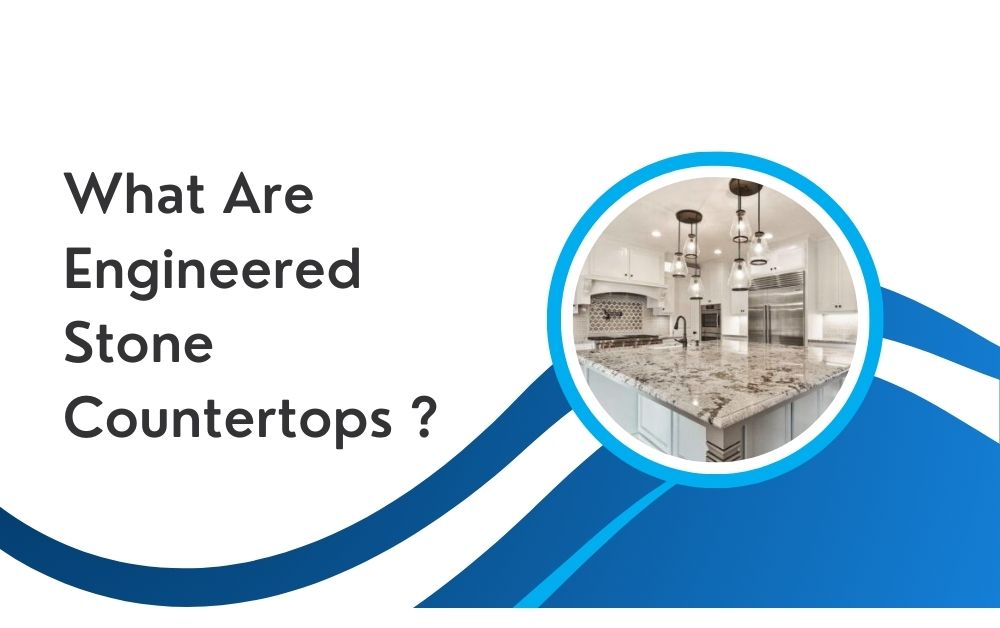
What Are Engineered Stone Countertops ?
When it comes to modern kitchen and bathroom designs, engineered stone countertops are increasingly becoming the go-to choice for homeowners and designers alike. Known for their durability and wide range of colors and patterns, these countertops blend natural beauty with human ingenuity, creating a functional and aesthetic surface that suits various interior styles. This blog explores what engineered stone countertops are, their benefits, how they compare to natural stone, and why they might be the perfect addition to your home.
Understanding Engineered Stone Countertops
What Are Engineered Stone Countertops?
Engineered stone countertops are manufactured from a mix of quartz crystals, resins, and pigments. Unlike natural stone slabs such as granite or marble, which are quarried, these countertops are crafted in factories. The primary ingredient, quartz, is one of the hardest minerals on Earth, making engineered stone incredibly durable.
How Are They Made?
The process of creating engineered stone involves grinding quartz crystals into a fine dust and blending them with resin binders under high pressure and heat to form solid slabs. Pigments are added during the mixing process to give the slabs their color and unique veining.
Benefits of Engineered Stone Countertops
1. Durability and Strength
Engineered stone countertops are renowned for their durability. The quartz and resin mixture results in a surface that is resistant to scratches, chips, and stains.
Key Features:
- Scratch Resistance: Quartz, being one of the hardest minerals, contributes to the scratch-resistant properties of engineered stone.
- Stain Resistance: The non-porous nature of engineered stone prevents liquids and stains from penetrating the surface, making it easy to clean and maintain.
2. Aesthetic Flexibility
One of the biggest draws of engineered stone is its versatility in appearance. It can mimic the look of natural stone but also offers a vast array of colors and patterns that are not found in natural materials.
Design Options:
- Variety of Colors: From pure whites to deep blacks and vibrant hues, engineered stone comes in almost every color imaginable.
- Consistent Patterns: Unlike natural stone, which can vary greatly from slab to slab, engineered stone provides consistency in pattern and color, ensuring that all sections of your countertop will match.
3. Low Maintenance
The ease of maintenance is a significant benefit of engineered stone countertops. Their non-porous surface does not require sealing, unlike many natural stones.
Maintenance Tips:
- Cleaning: Simply use soap and water or a mild detergent to keep your countertops looking new.
- No Sealing Required: There’s no need for regular sealing or special treatments.
4. Health and Hygiene
Engineered stone countertops are non-porous, which means bacteria, mold, and mildew can’t penetrate the surface, making them a hygienic option for both kitchens and bathrooms.
Health Benefits:
- Non-Porous: Limits the growth of bacteria and mold, promoting a cleaner and healthier kitchen environment.
- Easy to Clean: Smooth surface allows for easy cleaning without harsh chemicals.
Comparing Engineered Stone to Natural Stone
Similarities and Differences
While engineered stone can mimic the look of natural stone, there are several differences to consider when deciding between the two.
Natural Stone:
- Unique Patterns: Each slab is unique, which can be a draw for those looking for one-of-a-kind designs.
- Porosity: Most natural stones are porous and require regular sealing to prevent stains and damage.
Engineered Stone:
- Uniformity: Offers a consistent appearance, which is ideal for large areas needing multiple slabs.
- Durability: Generally more durable and less prone to chipping and cracking than natural stone.
Why Choose Engineered Stone Over Natural Stone?
- Cost-Effective: Often more affordable than premium natural stone.
- Durability: Better suited for high-traffic areas and usage.
- Maintenance: Requires less upkeep, saving time and money in the long term.
Choosing the Right Engineered Stone Countertop
1. Consider Your Lifestyle
Think about how you use your kitchen or bathroom. If you have a busy household, durability and low maintenance might be your top priorities.
2. Match Your Decor
Select a color and pattern that complement your existing cabinetry, flooring, and wall colors. Engineered stone offers a wide range of options to match any decor.

3. Budget Accordingly
Determine your budget beforehand. While engineered stone can be cost-effective, prices can vary based on the quality and design complexity.
4. Professional Installation
Always opt for professional installation to ensure that your countertops are correctly fitted and secured. This ensures longevity and maximizes the appearance and functionality of the stone.
Conclusion
Engineered stone countertops provide a perfect blend of beauty, durability, and ease of maintenance, making them an excellent choice for those looking to upgrade their kitchen or bathroom. With the vast array of color and design options available, you can achieve the aesthetic of natural stone along with added benefits that engineered stone provides. Whether you are renovating your home or building a new one, consider engineered stone for a countertop solution that combines the best of nature with human creativity and technical innovation.
Note:- To read more articles visit on kacmun.


